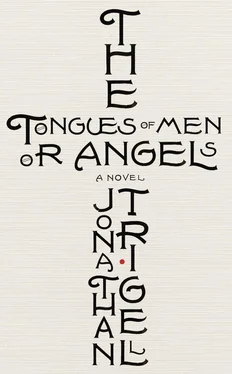Can it even be called a nail, that crude, cruel spike? It is a nail, if siege engines and sling shots are both called catapults: it is a nine-inch dark-iron wedge of a nail. It is placed at the midpoint between the prisoner’s wrist and elbow, where flesh and bone are still strong enough to take the force of holding a man up without tearing free. Even so the soldier places a rough lump of wood on top of the arm as a wad; to stop the nail head, the size of a double sestertius coin, eventually pulling through. The wood also prevents that first spurt of blood going into the hammerer’s eyes.
Though the soldiers always try their best, occasionally one will inevitably spike an artery — nobody is perfect — and the condemned man will bleed out quickly. This prisoner is not that lucky. But, still, it is something of a kindness to be nailed at all. Prisoners who are only tied to the crucifix often survive for many days longer.
At the sound of the hammering the women in the near distance start to shriek and clutch one another and cling to the man in their midst. A man trying to be strong, but in danger of submerging, beneath his mother and the others and the horror.
The prisoner’s legs are restrained, held either side of the prone post, and spiked in turn through the heels; further bits of wood are used to ensure that they won’t tear free. The lumps of wood were found on the ground. Most probably, in this treeless quarry, they are bits of former crosses.
And, as regulation dictates, the plaque with the prisoner’s crime inscribed is also hammered in place. King of the Jews , it reads; in triplicate.
The whole mass — cross and man — is rope-hoisted and pole-pushed up by the soldiers, straining and hauling. It drops with a jolt when the post, fully upright, finds the slot of its hole in the rock. And the prisoner cries out, as that force multiplies the pain of his own weight, for the first time fully suspended from the nails. His hands are held up skywards. Fingers curled in pain, in the shape they formed at the instant the nails were struck. Frozen like that.
Now he has been raised, the prisoner beholds the woman and her son, his mother and brother. Though he has three other brothers, this one will be her eldest now; it is he who must take care of her. The prisoner mouths something to them, but he has not the strength left to hold up his head for long.

A few hours later, he loudly cries his last words, which are, Eloi, eloi lama sabachthani — ‘ My God, my God, why have You forsaken me?’
Maybe he is trying to recite the psalm that begins with this line, using the final shreds of energy that remain to him; perhaps he is only asking what any man of faith might, in circumstances such as these.
If those who watch from a distance were still holding hope for a miracle, it has not come; at least not yet. When they realize that the prisoner’s spirit has left him, the women howl and shriek the shrill ring of Middle Eastern mourning.
The miracle didn’t come and the Romans did. The man died, as men will, when nailed up high, beyond the length their lungs can take. Though he died mercifully quickly: he survived only hours on the cross, when many last multiple days and some pitiable few can suffer for over a week.
Surprised at the speed of the prisoner’s death, wary of trickery, a soldier pierces his side with the long prong of his spear. The blood that flows is already sluggish and the prisoner makes no gasp or groan.
The half-death of the scourging must have carried too far, or perhaps the kindness of some poison was smuggled to the man in the mêlée of the crowds, an action not uncommon among Judaeans, trying to aid the condemned in the only way they can.
Normally the corpses are guarded and left where they hang. That is part of the penalty: for the condemned, while they still live, and their families to know that the birds and beasts will take what they can reach of the body and that the rest will rot. Fear of remaining without grave or pyre is a profound extra punishment in most of the societies that Rome has subdued, but especially so in Judaea. Crucifixion does not only consist of the public dishonour and the inhuman agony, but also this final assault: that even the corpse will not be given the proper rites.
But an admirer they call the Highlander, a wealthy and powerful Pharisee, has paid a large sum of money so that this last insult will not be so for the body of the prisoner. The Highlander couldn’t stop the execution, but he has begged and bribed the prefect, Pontius Pilate, for the right to take the corpse at least. That it might be given the proper ceremonies and a decent burial.
The women watch and follow the Highlander’s men, who take the body down and wrap it in a clean linen cloth and carry it to a newly excavated tomb. A tomb where no one has ever been laid, cut into a hillside not far from Golgotha. An honourable sepulchre, not the criminal cemetery, where those condemned by Jewish trial would be interred, and not the rotting shame of Rome. From a distance, the women carefully mark which grave-cave it is and watch the stone-carved tomb-cover being rolled into place over the entrance.
It is little comfort. But on such a day, it is startling to find any comfort at all. And at least the dead man can be given the proper rites. He can be gently washed of blood and tended with oils and spices. He can be shown the duties he deserves.
But not now: darkness is approaching. This is the day of preparation, tomorrow is Passover and the following day is the Sabbath: all other obligations must wait. Already the ram’s horn blows from the corner of the Temple, to warn the goatherds and the fieldworkers and all others outside the walls, these women included, that the double Sabbath approaches. The horn blasts remind devout people that they must cease all work, down all tools, return to their dwellings. Until three stars are visible at nightfall the day after tomorrow, nothing must disturb sacred rest, not even the honour of the dead.
Twenty-one Years after the Crucifixion
In a world composed largely of city states, there are many great cities. Paul has by now tasted not a few of them: Philippi, the home of his new sponsor Lydia, from which he has only recently departed; Tarsus, his birthplace, itself is no mean city; then there is Jerusalem, site of the Temple, which in turn houses the Holy of Holies. Though Paul now doubts those twin pillars are as important as the self-elevated Jerusalem fellowship would have you believe; Pharisees and hypocrites, chief among them those other Pillars. But Jerusalem remains undoubtedly a hallowed place: where the Saviour was sacrificed. And then there is Rome, where Paul suspects he must eventually head to win this battle of wills with the phoneys who plague and beset him, trapped in the world of their outdated Torah laws. How Paul would love to be a citizen of Rome, the centre of the Empire, the centre of the world. But for all that, for all these great cities, there is something more marvellous about Athens: the cultural pinnacle.
Every man of worth should stay in Athens for a spell, soaking in the learning and knowledge that swells from its every street and shaded grove. Paul’s travel-calloused feet feel quite light as he trips the paving of Athens. At each corner there is a sculpture, and though the outdated gods depicted are imaginary, you can still admire the skill of the men who created the stone marvels. Statues are just empty shells and offer no temptation to the strong in spirit. Only the feeble need to fear graven images. How James would likely tremble in this place. And Cephas, Old Stony himself, scared of mere stones!
The Athenian buildings seem dusted with white light, as if God’s favour is poured out upon them. Even the tenements and the store fronts have an otherworldly glow. And over it all, the Acropolis, built up on giant casement blocks merged into cliff rocks, as if it all surges as one from beneath the earth.
Читать дальше













